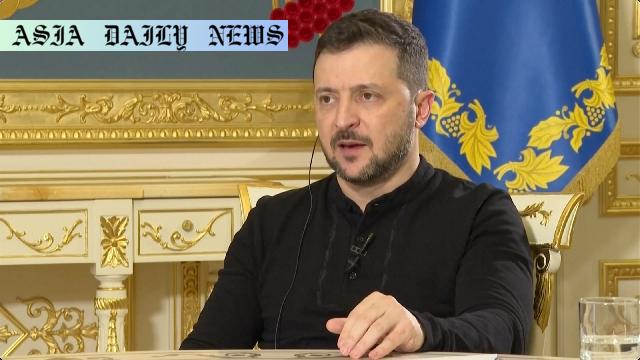Zelenskyy criticizes Putin for posing as a mediator while intensifying attacks on Ukraine’s energy infrastructure.
Zelenskyy accused Putin of hypocritically posing as a Middle East mediator.
Russian forces attacked Ukraine with 11 missiles and 183 drones.
Energy infrastructure in Kremenchuk suffered severe damage.
Putin offered Russia as a mediator despite fueling the Iran-Israel conflict.

Zelenskyy Condemns Putin’s Dual Tactics
The crisis in Ukraine continues to escalate as President Volodymyr Zelenskyy voiced staunch criticism of Russian President Vladimir Putin for his dual approaches in global and regional conflicts. In recent statements, Zelenskyy slammed Putin for attempting to portray himself as a peace mediator in the Middle East while relentlessly attacking Ukraine. As tensions flare between Israel and Iran, Russia appears to cultivate its narrative as a balancing global power, despite its relentless campaign against Ukrainian territories. The suspicious alignment of these strategies reveals deeper geopolitical stakes in maintaining influence in both European and Middle Eastern dynamics.
The Scale of Russian Missile Attacks
According to the Ukrainian Air Force, Russia launched a devastating assault over the weekend, with 11 missiles and a staggering 183 drones aimed at Ukraine. These strikes were concentrated on heavily significant civilian and energy infrastructure within Kremenchuk, a vital energy hub situated in the Poltava region. Notably, Russia’s choice of Iranian-made drones, designed to evade defense systems, signals heightened collaboration between the two nations. The Kremlin’s official narrative claims these strikes targeted oil refineries supplying fuel essential for Ukraine’s military in the Donbas region. Regardless, the toll on civilian security and utilities is evident.
A Hypocritical Bid for Mediation
Despite escalating its military aggression and openly admitting responsibility for some of these attacks, Russia—under Putin’s leadership—has made overtures toward mediating the highly sensitive Israel-Iran conflict. On a recent call with former US President Donald Trump, Putin offered his services as a peace negotiator, placing his nation in direct diplomatic interplay between tensions in the Middle East. However, such offers seem undermined by Russia’s clear allegiance with Tehran, as evidenced by the use of Iranian technology to wreak havoc in Ukraine. Zelenskyy’s criticism underscores the duplicity of these gestures, hinting at ulterior motives to maintain Russia’s geopolitical stronghold.
Impact of Global Conflicts on Ukraine
The overlapping conflicts in Ukraine and the Middle East highlight a precarious redistribution of global resources and military aid. President Zelenskyy has expressed frustration and concern over the potential diversion of Western defense support toward Israel as it deals with its own crisis. With reduced aid, particularly in air-defense systems, Ukraine faces increased vulnerability against ongoing Russian aggression. This precarious shift not only impacts Ukrainian sovereignty but also sets a precedent for international crises to detract from protracted wars. The duality of such challenges emphasizes the interconnectedness of global warfare and geopolitics.
The Need for Unified Global Responses
Zelenskyy’s latest statements shine a harsh light on the complexities of international diplomacy amid active conflict zones. While the Russian narrative may present a facade of mediation, the simultaneous attack on Ukrainian territory shatters any credibility. For Ukraine, maintaining focus on defending national integrity requires continued and robust support from allies. Equally, global players must recognize the risks of spreading their resources thin across simultaneous conflicts. A concerted, united effort is essential to prevent further escalation across multiple regions, ensuring that aggressors are confronted with decisive resistance.
Commentary
Putin’s Strategy of Dual Narratives
Vladimir Putin’s attempt to juggle his portrayal as a regional Middle East mediator while maintaining unabated aggression in Ukraine is as ambitious as it is hypocritical. This strategy is indicative of a leader who is unwilling to sacrifice any opportunity to consolidate power and influence. On one hand, extending overtures to mediate the Israel-Iran conflict positions Russia as a major player in the Middle Eastern political arena. On the other, the continuous barrage on Ukrainian energy infrastructure clearly outlines his broader territorial ambitions in Eastern Europe. The transparency of such doublespeak undermines any real claims to integrity or neutrality on the global stage.
The Geopolitical Interplay of Conflicts
The overlap between multiple conflicts challenges traditional notions of international intervention. With tensions spiking globally, there’s increasing concern over how limited resources—both financial and military—are distributed. Putin’s ability to align himself with Iran not only strengthens the Kremlin’s international alliances but also forces Western forces into splitting their focus between addressing Ukraine’s needs and exacerbating tensions in the Middle East. In the long run, the beneficiaries of such stretched defenses are primarily aggressor nations, benefiting from delays in wholesale opposition to their advances.
A Call for Unified International Strategy
Now, more than ever, it’s clear that a unified international strategy is the need of the hour. Ukraine’s battle against Russian aggression cannot afford to be sidelined, regardless of simultaneous crises elsewhere. Balancing these priorities is no easy feat, but the stakes of failure are far-reaching. Zelenskyy’s call to maintain support for Ukraine is not merely an appeal for survival but a critical reminder of the value of global cooperation. Effective management of international crises necessitates collective action—something the world must continue striving to achieve amidst mounting tensions.


